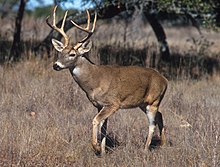Odocoileus is a genus of medium-sized deer (family Cervidae) containing three species native to the Americas.[1][3][4] The name is sometimes spelled odocoeleus; it is from a contraction of the roots odonto- and coelus meaning "hollow-tooth".
| Odocoileus Temporal range: Pleistocene to present
| |
|---|---|

| |
| Odocoileus virginianus | |
| Scientific classification | |
| Domain: | Eukaryota |
| Kingdom: | Animalia |
| Phylum: | Chordata |
| Class: | Mammalia |
| Order: | Artiodactyla |
| Family: | Cervidae |
| Subfamily: | Capreolinae |
| Tribe: | Odocoileini |
| Genus: | Odocoileus Rafinesque, 1832[1] |
| Type species | |
| Odocoileus speleus[1] Rafinesque, 1832
| |
| Species | |
|
Odocoileus hemionus | |
Extant species
| Odocoileus hemionus | Mule deer | western half of North America. | |
| Odocoileus pandora | Yucatan brown brocket | Yucatán Peninsula (Mexico, Guatemala, Belize) | |
| Odocoileus virginianus | White-tailed deer | throughout most of the continental United States, southern Canada, Mexico, Central America, and northern portions of South America as far south as Peru and Bolivia.[5] |
References
- ^ a b c Odocoileus, [1] Mammal Species of the World, 3rd Edition
- ^ "Fossilworks: Odocoileus salinae". fossilworks.org.
- ^ Valerius Geist (1998). Deer of the World: Their Evolution, Behaviour, and Ecology. Stackpole Books. ISBN 978-0-8117-0496-0.
- ^ Gutiérrez, E. E., Helgen, K. M., McDonough, M. M., Bauer, F., Hawkins, M. T., Escobedo-Morales, L. A., ... & Maldonado, J. E. (2017). A gene-tree test of the traditional taxonomy of American deer: the importance of voucher specimens, geographic data, and dense sampling. ZooKeys, (697), 87.
- ^ "IUCN Red List maps". Explore and discover Red List species ranges and observations.